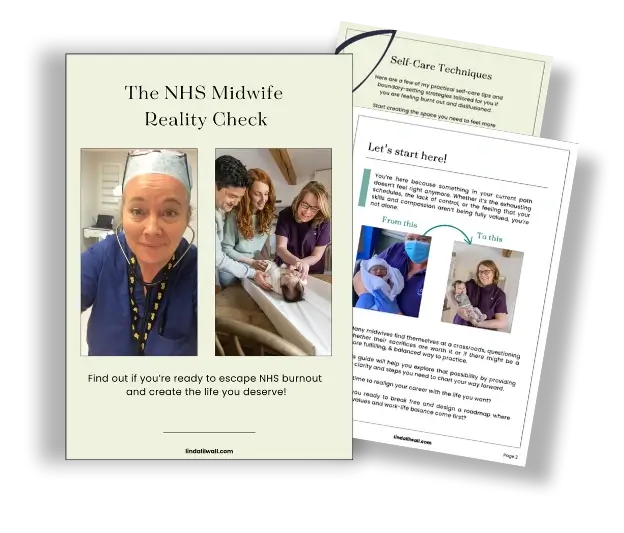Midwifery is a profession deeply rooted in care, advocacy, and empathy. Midwives stand alongside families in some of the most transformative, joyful, and sometimes devastating moments of their lives. But what happens when the very act of caring becomes unsustainable?
In an NHS system stretched beyond its limits, midwives are experiencing compassion fatigue, vicarious trauma, burnout, and workplace bullying at alarming rates. These issues are not just personal struggles; they are systemic problems with devastating consequences for individuals, maternity services, and the women they care for.
This article explores the causes, impact, and practical steps midwives can take to protect themselves while acknowledging that self-care alone is not a solution to a broken system.
Compassion Fatigue: The “Cost of Caring”
Compassion fatigue is the emotional and physical exhaustion that arises from prolonged exposure to the suffering of others. It has been described as the “cost of caring” for those in emotional distress (Figley, 1982). While midwifery is often seen as a rewarding career, the relentless exposure to trauma, loss, and the emotional needs of others can leave midwives emotionally depleted, detached, and struggling to find meaning in their work.
One of the biggest contributors to compassion fatigue is the sense of powerlessness that many NHS midwives feel. They enter the profession with a desire to provide high-quality, individualised care, only to find themselves working under unsafe staffing levels, resource constraints, and an increasingly medicalised, target-driven system. This conflict between what midwives know is best for women and what they are actually able to provide creates a form of moral distress, which is a key driver of emotional exhaustion.
Over time, midwives experiencing compassion fatigue may notice changes in themselves. They may find it difficult to emotionally connect with the families they support or feel numb to situations that once deeply affected them. Some begin questioning their ability to continue in the profession, while others may struggle with physical symptoms such as chronic headaches, digestive issues, or extreme fatigue. In severe cases, compassion fatigue can lead to depression, anxiety, or even post-traumatic stress injury.

For midwives struggling with compassion fatigue, it is crucial to recognise that this is not a personal failing, it is a sign of working in an environment that is demanding too much, too often. Seeking support through peer debriefing, counselling, or mentorship can help to validate experiences and provide coping mechanisms. Equally important is setting emotional boundaries, midwives can be compassionate without absorbing every distressing situation they encounter.
Vicarious Trauma: When Midwives Absorb Others’ Pain
Vicarious trauma is a more profound shift that occurs when midwives internalise the traumatic experiences they witness. Unlike compassion fatigue, which primarily results in exhaustion, vicarious trauma can actually alter a midwife’s worldview, changing how they perceive safety, trust, and their role in the profession.
For midwives, vicarious trauma often develops after repeated exposure to traumatic births, stillbirths, obstetric emergencies, or experiences where women have suffered mistreatment or coercion. The more helpless a midwife feels in these moments, the more likely they are to carry those emotions home with them. Some may develop intrusive thoughts, flashbacks, or even nightmares about difficult cases. Others may start to feel constantly on edge, emotionally detached, or hyper-aware of potential dangers in their work environment.
One of the most damaging effects of vicarious trauma is the erosion of trust in the system. Many midwives describe a growing sense of disillusionment when they realise that they are working within a hierarchical, sometimes hostile, and deeply flawed institution. This can lead to isolation, resentment, or a growing detachment from their professional identity.
Addressing vicarious trauma requires more than just resilience, it requires acknowledging the emotional toll of midwifery and providing structured, trauma-informed support. Counselling, therapy (including EMDR for trauma processing), and safe spaces for reflection and discussion can help midwives process these experiences rather than suppressing them.
Burnout: When the Fire Goes Out
Burnout is not just about feeling tired, it is a chronic state of emotional, mental, and physical exhaustion caused by prolonged workplace stress (Maslach & Leiter, 2016). NHS midwives are particularly vulnerable due to unmanageable workloads, a lack of autonomy, and moral injury from being unable to provide the care they know is right.
The root cause of burnout in midwifery is a system that continuously demands more while giving less. Unsafe staffing levels force midwives to manage multiple complex cases at once, often with no time to debrief, rest, or even take a meal break. Bureaucratic pressures mean that more time is spent on paperwork and compliance than on direct care. Constant overtime, night shifts, and lack of recovery time create a level of exhaustion that currently feels as if no amount of self-care can fix.

A midwife experiencing burnout may start to feel detached from their work, resentful of their role, and increasingly cynical about the profession. Some describe a feeling of “just going through the motions”, while others experience physical symptoms such as chronic fatigue, headaches, or frequent illness. The risk of medical errors increases, and many midwives leave the profession altogether, further worsening the staffing crisis.
Protecting against burnout requires structural change, but in the meantime, midwives can take practical steps to protect their own well-being. Setting firm boundaries around overtime and workload, seeking peer or professional support, and considering alternative career paths (such as independent midwifery or education) can help regain a sense of control.
Bullying in Midwifery: A Silent Epidemic
Bullying in midwifery is widespread, but rarely acknowledged at an institutional level. A report by the Royal College of Midwives in 2021 found that over 80% of midwives had witnessed or experienced bullying in the workplace.
Bullying can take many forms, senior midwives intimidating juniors or colleagues undermining or ostracising each other, Midwives can face managerial pressure to conform to unsafe practices, where they are expected to comply with decisions that compromise patient safety or ethical care. This can happen in several ways. Many are forced to accept dangerous staffing levels, managing more women than is safe while being told to “just get on with it.” If they raise concerns about patient safety, they may be dismissed or told there is no alternative, making them feel trapped between complying with unsafe conditions or facing professional repercussions.
Some midwives are actively discouraged from reporting incidents, with managers implying that raising concerns will create unnecessary paperwork. In other cases, midwives are pressured to rush care, despite knowing it may negatively impact outcomes or discharge women too soon, or limit birth support, such as being told not to stay with a woman in labour, even if she needs one-to-one support, because there isn’t enough staff or being expected to discharge women too soon after birth to free up beds, even if they need more monitoring, or being pushed to work through breaks, leading to exhaustion and increased risk of errors.
Others are put in ethically and legally challenging positions, where they feel coerced into directing women toward interventions they don’t want or denying them choices under the guise of hospital policy, even when those choices are legally protected. If a midwife refuses to comply with these expectations, they may experience gaslighting, professional exclusion, or even disciplinary threats, making it clear that speaking up is not welcome.
Over time, this leads to moral injury, where midwives know the right course of action but are prevented from taking it, leaving them emotionally distressed and deeply disillusioned. This culture of silence and coercion is a major contributor to burnout, anxiety, and midwives leaving the profession entirely, further worsening the crisis in maternity care.
The impact of bullying is devastating. Many midwives experience anxiety, depression, and even PTSD symptoms. Some begin doubting their own clinical judgment, leading to hesitation in high-risk situations or second-guessing routine decisions because of lack of confidence. Others feel so broken by the system that they walk away from midwifery altogether.
Addressing workplace bullying requires a cultural shift in midwifery leadership, but on an individual level, midwives can take steps to protect themselves. Keeping detailed records of incidents, seeking support from professional bodies, and finding alternative employment if necessary can be crucial in reclaiming autonomy.
Final Thoughts
Midwives deserve better. Protecting yourself isn’t selfish, it’s necessary for your survival and the future of maternity care.
Book a Discovery call with Linda if you are interested in becoming or developing as an Independent Midwife.
References
- Figley, C. R. (1982) , Trauma and Its Wake.
- Maslach, C., & Leiter, M. P. (2016), Burnout: The Cost of Caring.


0 Comments